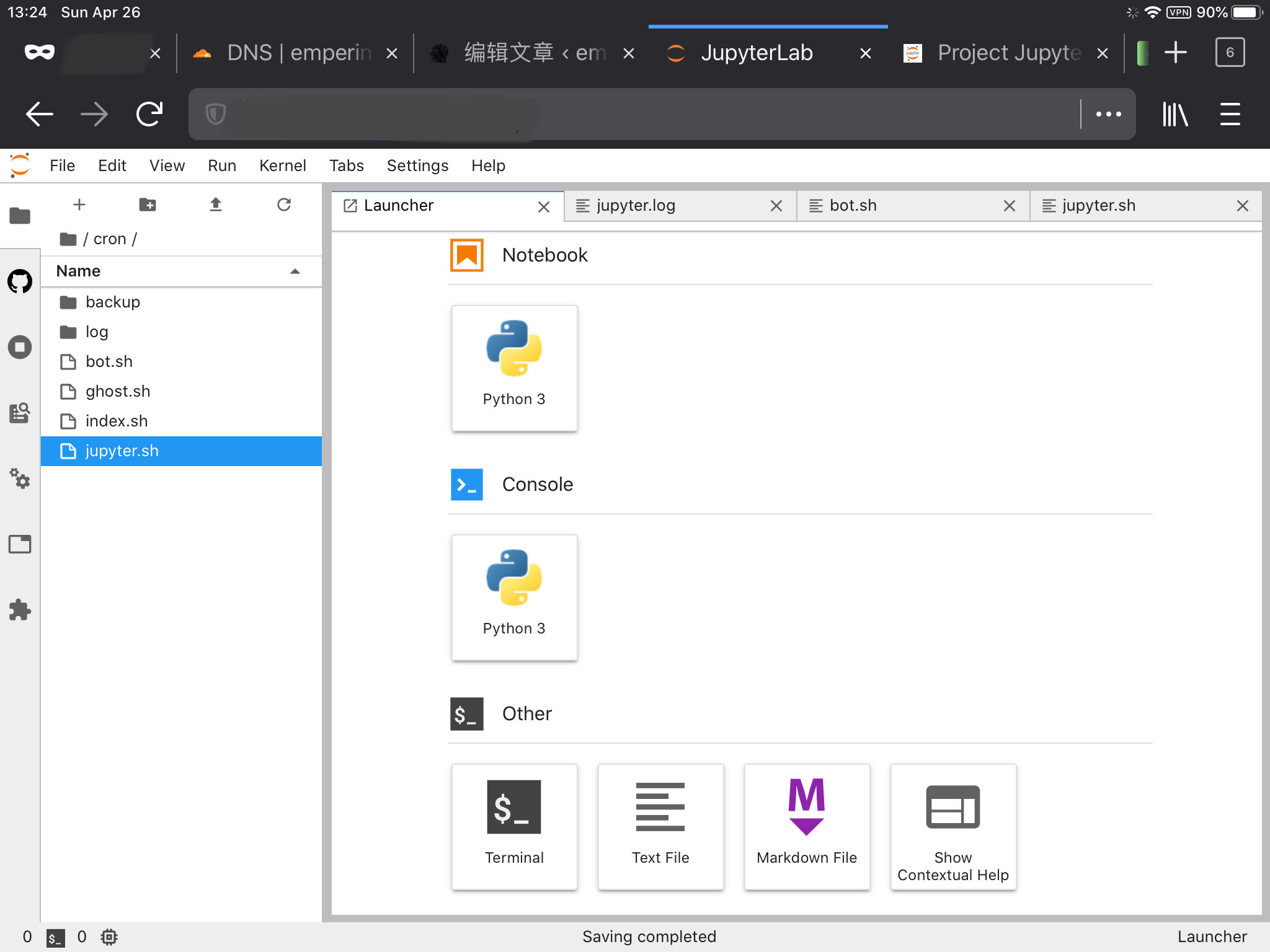How to set up a jupyterlab in vps

cause
I’m very sad that i left my laptop at school,but I can’t have fun all the time,So I rent a vps which have high performance than I have and set up a jupyterlab on it,It’s very nice that I can play some funny things on it.I have tried to use a Cloud Studio on Tencent,it will let us thought is my data safe enough?
install
install jupyterlab
pip3 install jupyterlabsetup login password
-
create a python document named a.py,write as follows:
from notebook.auth import passwd passwd() -
you will get a hash password when you input your password as the a.py runs
python3 a.py -
generate a config,your will get the config address when it finished
jupyter notebook --generate-config -
change the value in config as follows,you can ingore the run script –allow-root If you set allow_root up is true there;
c.NotebookApp.allow_root = True c.NotebookApp.open_browser = False c.NotebookApp.password = 'your hash password you generate!'
config nginx
You can ignore this steps if you wanna use ip to access your service,I just show the important things here,for my vps security!
location / {
proxy_pass http://127.0.0.1:999; # you can change your port if it was used by another service !
proxy_set_header X-Forwarded-For proxy_add_x_forwarded_for;
proxy_set_header X-Real-IPremote_addr;
proxy_set_header Host http_host;
proxy_http_version 1.1;
proxy_redirect off;
proxy_buffering off;
proxy_set_header Upgradehttp_upgrade;
proxy_set_header Connection "upgrade";
proxy_read_timeout 86400;
}run
You can change some value if you don’t wanna use in your run shell.
| value | function |
|---|---|
| ip | run in localhost |
| port | same with nginx config |
| allow-root | run with root authority |
nohup jupyter lab --ip=127.0.0.1 --port=999 --allow-root >> jupyter.log 2>&1 &protect process
It’s very nice if you need to ensure jupyterlab is always run in vps
#!/bin/sh
#Process Name
PRO_NAME=jupyter
while true ; do
T=(date)
#get process informatinon if some wrong happens!you can put it into a log for your check!
Process=`ps -ef | grep "{PRO_NAME}" | grep -v grep | grep -v 'jupyter.sh' | grep -v '[{PRO_NAME}]'`
# echo "T : Process"
#get the running process number NUM=`ps -ef | grep "{PRO_NAME}" | grep -v grep | grep -v 'jupyter.sh' | grep -v '[{PRO_NAME}]' | wc -l `
# echo "T : It has started !"
# echo "{NUM}"
#It will start if it small than 1
if [ "{NUM}" -lt "1" ];then
echo "T :Process"
echo "T :{PRO_NAME} was killed"
# jupyterlab running DIR
cd /home/lab
# you should change for your condition
nohup jupyter lab --ip=127.0.0.1 --port=999 --allow-root >> jupyter.log 2>&1 &
echo "T :{PRO_NAME} restart ! "
sleep 10s
#it will kill all same process and restart if it lager than 1
elif [ "{NUM}" -gt "1" ];then
echo "T : Process"
echo "T : more than 1 {PRO_NAME},killall{PRO_NAME}"
ps -ef | grep PRO_NAME | grep -v grep | grep -v 'jupyter.sh' | cut -c 9-15 | xargs kill -9
cd /home/lab
nohup jupyter lab --ip=127.0.0.1 --port=999 --allow-root >> jupyter.log 2>&1 &
echo "T : killall and restart!"
sleep 10s
fi
# it will take some time to run jupyterlab,so we shoud deny time to get right number
sleep 30s
done
exit 0Copyright
Unless otherwise noted, all work on this blog is licensed under a Attribution-NonCommercial-NoDerivatives 4.0 International (CC BY-NC-ND 4.0) License. Reprinted with permission from -https://blog.emperinter.info/2020/04/26/how-to-set-up-a-jupyterlab-in-vps